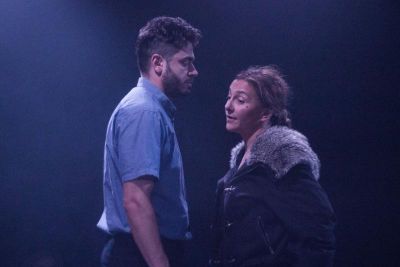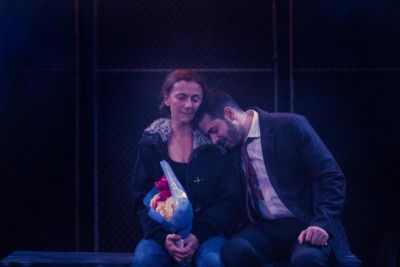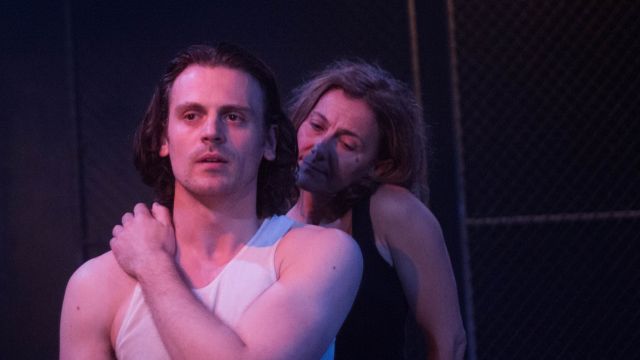Ironbound
A bus shelter in New Jersey, USA, is where five key incidents play out in the life of a worn but fiery Polish immigrant woman, Darja (pronounced ‘Daria’ – Gabrielle Rose-Carter). As indifferent traffic passes in the night and buses come and go, Darja plays out her encounters – in the present, with lover Tommy (Alex Tsitsopoulos), with a Good Samaritan teenage drug dealer, Vic (Will Atkinson), and in the past with husband Maks (Anthony Scudi). Via the dense, hyper-naturalistic, punchy dialogue, we piece together Darja’s story.
With its bold circular structure, Ironbound is a portrait of this woman over twenty-two years. A woman who becomes sharp and bitter – but not without humour – stubborn, cynical, mistrustful and proud. She comes to America, to New Jersey, with her husband Maks, only to find the ‘American Dream’ is not what was promised. She works in a factory – that closes - and the men in her life declare their love but prove unreliable. Dismissing pleas and entreaties, she comes to insist with a snarl, ‘Let’s talk about money.’
 Performances and direction – the latter by Suzanne Heywood - are excellent, something we have come to expect from the Q44 company. As Darja, Ms Rose-Carter maintains a coiled intensity behind a carapace of mistrust and aggressive scepticism – and in an impeccable Polish accent throughout. Mr Scundi is perhaps too young (or looks too young) and, some instinct tells me, is too good-looking for Maks, but he brings to the role such a wounded optimism and helplessness that we attend only to his heartbreak and loss. Mr Atkinson gives sweetness and innocence to Vic, Darja’s chance encounter, the gangly awkward teenager, who scarcely knows what he’s doing. In the play’s depiction of the American underclass, he supplies a variation on Darja’s story. Mr Tsitsopoulos bookends the story in Darja’s desperate but recalcitrant present. It’s a layered performance from this fine actor. He grovels with squirming apologies, but there are also just restrained bursts of anger. Darja may have right on her side, but she is infuriating. And yet there is a tender sense that Tommy really does – in his way – love her.
Performances and direction – the latter by Suzanne Heywood - are excellent, something we have come to expect from the Q44 company. As Darja, Ms Rose-Carter maintains a coiled intensity behind a carapace of mistrust and aggressive scepticism – and in an impeccable Polish accent throughout. Mr Scundi is perhaps too young (or looks too young) and, some instinct tells me, is too good-looking for Maks, but he brings to the role such a wounded optimism and helplessness that we attend only to his heartbreak and loss. Mr Atkinson gives sweetness and innocence to Vic, Darja’s chance encounter, the gangly awkward teenager, who scarcely knows what he’s doing. In the play’s depiction of the American underclass, he supplies a variation on Darja’s story. Mr Tsitsopoulos bookends the story in Darja’s desperate but recalcitrant present. It’s a layered performance from this fine actor. He grovels with squirming apologies, but there are also just restrained bursts of anger. Darja may have right on her side, but she is infuriating. And yet there is a tender sense that Tommy really does – in his way – love her.
 No set or costume designer is credited in the program, but the set – a grim, grey platform backed by wire mesh and surrounded by gravel – could not be more fittingly bleak. The gravel, by the way, is a brilliant touch: its crunch underfoot as the characters search for what to say next provides a heightening of the silence. Likewise, Justin Gardam’s unobtrusive sound design: the hum and whine of passing traffic, a bus’s air brakes and idling engine, the stillness of a deserted place. Lighting by John Collopy creates cold night and thin sunlight and the seasons.
No set or costume designer is credited in the program, but the set – a grim, grey platform backed by wire mesh and surrounded by gravel – could not be more fittingly bleak. The gravel, by the way, is a brilliant touch: its crunch underfoot as the characters search for what to say next provides a heightening of the silence. Likewise, Justin Gardam’s unobtrusive sound design: the hum and whine of passing traffic, a bus’s air brakes and idling engine, the stillness of a deserted place. Lighting by John Collopy creates cold night and thin sunlight and the seasons.
Such is the drama and our need to know Darja’s story and her fate, that we ignore the contrivance of all these incidents occurring at this one bus shelter. In fact, piecing together that story – which at one point include her being homeless – and the spikey dialogue Martyna Majok gives her, carries us through to the – to me – surprising end. Director Suzanne Heywood says that ‘a process of deconstruction occurs which liberates Darja, providing a form of redemption.’ I’m not sure that Darja is redeemed or that she needs to be. At the end, if anything, she takes a risk – the triumph of hope over experience, as Dr Johnson said about second marriages – and decides to trust. But you can decide that for yourselves. Either way, if and when you see this powerful presentation of flawed, struggling but very real human beings in an America that is not so ‘great’, you cannot fail to be moved.
Michael Brindley
Photographer: John Collopy.
Subscribe to our E-Newsletter, buy our latest print edition or find a Performing Arts book at Book Nook.

